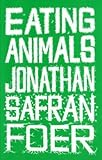Eating animals
av Jonathan Safran Foer (forfatter).
2016 Heftet
Omtale fra forlaget
Eating Animals is Jonathan Safran Foer's eye-opening account of where meat comes from 'I simply wanted to know - for myself and my family - what meat is. Where does it come from? How is it produced? What are the economic, social and environmental effects? Are there animals that it is straightforwardly right to eat? Are there situations in which not eating animals is wrong? If this began as a personal quest, it didn't stay that way for long . . . ' Jonathan Safran Foer's Eating Animals is the most original book on the subject of food written this century. It will change the way you think, and change the way you eat. For good.'Moving, disturbing, should be compulsory reading. A genuine masterwork. Read this book. It will change you' Time Out'Shocking, incandescent, brilliant' The Times'Everyone who eats flesh should read this book' Hugh Fearnley-Whittingstall'Gripping, horrible, wonderful, breathtaking, original. A brilliant synthesis of argument, science and storytelling. One of the finest books ever written on the subject of eating animals' The Times Literary Supplement'Horrifying, eloquent, timely' Spectator'If you eat meat and fish, you should read this book. Even if you don't, you should. It might bring the beginning of a change of heart about all living things' Joanna LumleyJonathan Safran Foer was born in 1977. He is the author of Everything is Illuminated, which won the National Jewish Book Award and the Guardian First Book award; Extremely Loud and Incredibly Close, which is now a major film starring Tom Hanks and Sandra Bullock; and Eating Animals. He is also the editor of A Convergence of Birds.
Bokdetaljer
Utgivelsesår 2016
Format Heftet
ISBN13 9780241950838
EAN 9780241950838
Språk Engelsk
Utgave 1
Finn boka på biblioteket
Finner du ikke ditt favorittbibliotek på lista? Send oss e-post til admin@bokelskere.no med navn på biblioteket og fylket det ligger i. Kanskje vi kan legge det til!
Bokelskeres terningkastfordeling
16 22 4 1 1 0Bokomtaler
Det å spise dyr er mye om kjøtt industrien og etikken. Det får oss til og stille spørsmål. Trenger jeg kjøtt for og overleve? Svaret er nei, etter mye av det skrevne og personlige meninger. Jeg har aldri vært fan av og spise dyr.
Det har alltid vært den skyld følelse, tenk om dyret hadde vondt. Dyret ble laget for å spises. Ikke en fin tanke. Etter et besøk på et slakt hus ble jeg vegetarianer før jeg leste denne boka. Denne boka ga meg så mye nye fakta, tanker og stiller spørsmål. Det er på tide for folk og åpne øyner. Jeg mener ikke alle bør og kutte alt kjøtt bruk, men mengden er den som teller.
Synes denne var bra og hadde mye i seg. Terningkast fem !!
Skriv en omtale Se alle omtaler av verket
Sitater fra dette verket
We can't plead ignorance, only indifference. Those alive today are the generations that came to know better. We have the burden and the opportunity of living in the moment when the critique of factory farming broke into the popular consciousness. We are the ones of whom it will be fairly asked: What did you do when you learned the truth about eating animals?
It´s much easier to be cruel than one might think
Our situation is an odd one. Virtually all of us agree that it matters how we treat animals and the environment, and yet few of us give much thought to our most important relationship to animals and the environment. Odder still, those who do choose to act in accordance with these uncontroversial values by refusing to eat animals (which everyone agrees can reduce both the number of abused animals and one's ecological footprint) are often considered marginal or even radical.
Just how destructive does a culinary preference have to be before we decide to eat something else? If contributing to the suffering of billions of animals that live miserable lives and (quite often) die in horrific ways isn´t motivating, what would be? If being the number one contributor to the most serious threat facing the planet (global warming) isn't enough, what is? And if you are tempted to put off these questions of conscience, to say "not now", then when?
Having little exposure to animals makes it much easier to push aside questions about how our actions might influence their treatment. The problem posed by meat has become an abstract one: there is no individual animal, no singular look of joy or suffering, no wagging tail, and no scream. The philosopher Elaine Scarry has observed that "beauty always takes place in the particular." Cruelty, on the other hand, prefers abstraction.
Legg inn et nytt sitat Se alle sitater fra verket
Bokelskere som følger boka
228 bokelskere følger dette verket.
Se alle bokelskere som følger dette verket































